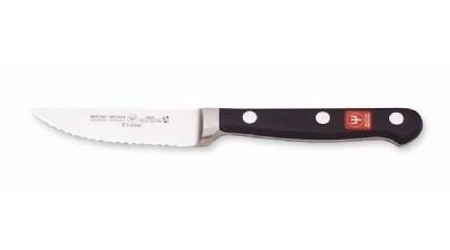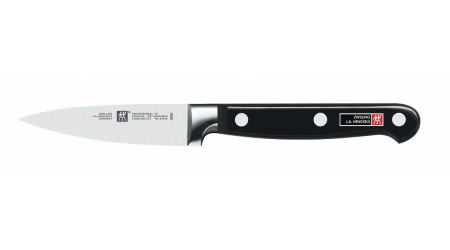Christmas & New Year Trading
Website: Open 24/7 for on-line ordering.
Customer Service/Warehouse: Closed 12pm Monday 23rd December 2024, re-opening 8:30am Thursday 2nd January 2025.
All orders placed over the holiday period will be processed in the New Year.
We wish all of our customers a Merry Christmas and a Happy New Year.
Paring knives buying guide—find the best paring knife for you
Paring knives are extremely versatile kitchen tools and invaluable to the professional chef. They have a small, sharp blade that makes them ideal for peeling, slicing and other precise food preparation tasks.
However, as a lot of people confuse paring knives with general utility knives or other small chef’s knives, it’s important to make the distinction here, so you can identify exactly what you need and which knife you should buy for your kitchen.
In this guide, we:
- explain how and why paring knives are used
- help you choose a paring knife based on brand, size, price etc.
Click a link below to jump to that section:
- What are paring knives and what are they used for?
- What types of paring knives are there?
- How do you use a paring knife?
- Paring knives—shop by:
What are paring knives and what are they used for?
A paring knife is a short chef knife, with a blade of 8–10 centimetres (3–4 inches) long. Its compact size is intended to make regular tasks such as cutting, trimming or slicing much easier and more precise.
Paring knives (also called peeling knives) are very versatile, and a mainstay of the professional kitchen as a result. Many cooks use them to peel or cut fruit and vegetables into small pieces, or to carry out other similar precision work.
The table below sets out some common uses for the trusty paring knife:
| Vegetables |
|
|---|---|
|
|
| Meat and fish |
|
There are several things to consider when buying a paring knife.
- Shape and size of the blade
- Materials used
- Comfort and grip—how it feels in your hand
- Price
- Brand
Read on to learn more about what’s involved in choosing a paring knife.
What types of paring knives are there?
When you go to buy a paring knife, you’ll generally have a choice of four different types:
1. Spear point/spear tip paring knife

Often called the “classic” paring knife, with its smooth, short and outwardly curved blade. Enables the chef to apply less pressure and let the knife do the work.
Some spear point products come as a serrated knife that allows the cook to use a sawing action.
Best used for: Peeling, slicing and coring fruits and vegetables
Pros: Multi-purpose knife—good for most jobs
Cons: Small cutting edge for slicing | Some cheaper knives may be too flimsy for more heavy-duty tasks
Pictured: Global GSF15 Peeling Knife Spearpoint Blade 8cm (£37.46)
2. Bird’s beak paring knife

Have a concave, sickle-shaped blade and a very sharp tip.
Best used for: Peeling and coring fruits and vegetables, trimming, delicate decorative work
Pros: Rounded blade allows for a style of cut that reduces waste
Cons: Difficult to sharpen with an electric knife sharpener
3. Sheep’s foot paring knife

Smooth, flat, straight blade and rounded tip means only the point of the blade touches the board during the chop.
Best used for: Julienne cutting (chopping vegetables and fruits into long, thin strips), cutting soft and hard cheese
Pros: Stay sharper for longer
Cons: Rounded tip lacks the sharpness of other types of knife
Pictured: Global NI Series GNFS-01 Paring Knife 9cm (£49.96)
4. Western-style Japanese paring knife

Shaped like a spear point paring knife but with a less-curved blade. Usually made of harder steel, which makes for a much sharper edge.
Best used for: Intricate cutting and carving, decorative garnishing
Pros: Allow for greater control
Cons: Razor-sharp, which can make certain tasks quite perilous | Generally expensive
How do you use a paring knife?
There are two ways to use paring knives:
- With a chopping board—these paring knives tend to have longer blades and look like miniature chef’s knives
- In the air, off the board—shorter paring knives and bird’s beak paring knives are used in this way (e.g. when peeling fruit), as they offer more control
Some paring knives have a plastic handle and a stamped blade, which makes them lighter and easier to use in the air. Knives with a stamped blade are also inexpensive.
Forged knives are heavier and more durable—and so might be better for use with a chopping board. However, they will cost more than knives with stamped blades.
How do you hold a paring knife?
A good grip is crucial, as you need to have complete control over the blade. Most paring knives are designed to fit the human hand snugly and provide balance and comfort when held.
You should be able to hold your paring knife so the handle is in your fist and you can guide the blade by placing your thumb or index finger on the spine. You direct the blade with the wrist rather than the heel of the hand, as with larger chef’s knives.
A good paring knife has a handle that’s ergonomically shaped so it has an ideal place for you to position your thumb while keeping a secure, comfortable grip.
Paring knives—shop by brand
At Russums, we sell paring knives made by a number of well-respected international brands. We feature some of their products below.
Wusthof paring knives
Many of the world’s finest chefs consider Wusthof knives the best in the world. Made in Germany, the knives are forged from one solid piece of high-carbon stainless steel and designed to have precise balance. The blades are extremely sharp and easy to keep that way.
Click here to read our guide to Wusthof kitchen knives.

Wusthof Classic Paring Knife 9cm
Also available:
Wusthof Classic Parer Serrated 8cm (£39.61)
Price: £36.57 (+ VAT)


Wusthof Silverpoint Paring Knife 8cm
Also available:
Wusthof Silverpoint Parer Serrated 10cm (£9.11)
Price: £6.82 (+ VAT)


Victorinox paring knives
Victorinox is a Swiss company renowned the world over for the quality of its kitchen knives. Chefs prize Victorinox knives for their strength, sharpness, comfort and balance.
Click here to read our guide to Victorinox kitchen knives.

Victorinox Forged Paring Knife 10cm
Also available:
Victorinox Forged Paring Knife 8cm (£31.16)
Price: £34.00 (+ VAT)

Victorinox Wooden Handle Paring Knife Plain Edge 10cm
Price: £10.97 (+ VAT)


Victorinox Plastic Handle Paring Knife 10cm
Also available:
Victorinox Plastic Handle Paring Knife 8cm (£3.04)
Victorinox Plastic Handle Paring Knife Serrated 8cm (£3.04)
Price: £3.64 (+ VAT)


Global paring knives
Global knives are famous for being among some of the finest kitchen knives in the world. Made in Japan, their blades are precisely sharpened on both sides, allowing for an extremely clean cut. They are also equipped with very finely balanced, perfectly weighted handles.
Click here to read our guide to Global kitchen knives.




Global GSF15 Peeling Knife Spearpoint Blade 8cm
Also available:
Price: £37.46 (+ VAT)
Henckels paring knives
Zwilling J. A. Henckels is one of the largest and oldest manufacturers of kitchen knives and is based in Germany. With almost 300 years of expertise, the company forges its knives from a single piece of high-carbon stainless steel, producing long-lasting blades which offer superb weight, balance and sharpness.


Kai Shun paring knives
Kai Shun knives combine centuries-old Japanese samurai blacksmithing with the sophisticated manufacturing techniques of the modern era. Made from Damascus steel, these knives have layered blades and are designed to always retain their incredible sharpness.
Click here to read our guide to Shun kitchen knives, and click here to learn more about Damascus knives.


Paring knives—shop by size
Paring knives have short blades—usually between 8cm and 10cm long—which makes them very easy to handle and control when cutting. Here are some of our best paring knives according to size.
8cm paring knives





8.5cm paring knives

9cm paring knives




10cm paring knives

Victorinox Wooden Handle Paring Knife Plain Edge 10cm
Price: £10.97 (+ VAT)




Paring knives—shop by price
Below, we present a selection of our paring knives according to price. If you’re on a tight budget, or indeed if money is no object, there are plenty of options.
Click here to read more about why kitchen knives vary in cost.
Under £10

Under £50




Under £100



Paring knives—shop by country of manufacture
Not all knifemakers follow the same processes and techniques, and a knife manufactured in Germany (or elsewhere in Europe) will generally be quite different to one made in Japan, for example. To read more about how Japanese and German knives compare, click here.
If you favour one country’s style of knifemaking over another, browse our range of products below, grouped by country of manufacture.
Paring knives made in Germany


Paring knives made in Japan




Paring knives made in Switzerland

Victorinox Forged Paring Knife 10cm
Also available:
Price: £34.00 (+ VAT)

Victorinox Plastic Handle Paring Knife 10cm
Also available:
- Victorinox Plastic Handle Paring Knife 8cm (£3.04)
- Victorinox Plastic Handle Paring Knife Serrated 8cm (£3.04)
Price: £3.64 (+ VAT)

Paring knives made in the UK

Paring knives—shop by serrated blade
Here are three of the best serrated paring knives in our range.

Wusthof Classic Paring Knife 9cm
Also available:
Wusthof Classic Parer Serrated 8cm (£39.61)
Price: £36.57 (+ VAT)


Wusthof Silverpoint Paring Knife 8cm
Also available:
Wusthof Silverpoint Parer Serrated 10cm (£9.11)
Price: £6.82 (+ VAT)


Giesser Paring Knife 10cm
Also available:
Price: £2.76 (+ VAT)

Paring knife sets
Choose a paring knife set from the options below.


Related content
Guide to carving and slicing knives
Victorinox kitchen knives—types, benefits, how to choose & FAQs
Global kitchen knives—types, how to choose, sharpening, FAQs
25 January 2019







